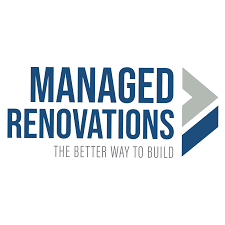Maryland’s New ADU Law & What It Means for Homeowners: Powered by Managed Renovations

Managed Renovations logo
A new Maryland law is reshaping conversation around housing, home design, & the ways in which property owners can adapt to changing family and community needs.
CHEVY CHASE, MD, UNITED STATES, November 21, 2025 /EINPresswire.com/ -- A new Maryland law is reshaping the conversation around housing, home design, and the ways in which property owners can adapt to changing family and community needs. House Bill 1466, which took effect on October 1, 2025, establishes Accessory Dwelling Units (ADUs) as a permitted use on single-family detached residential lots across the state.The law, passed with bipartisan support, directs every county and municipality to adopt conforming regulations by October 1, 2026, ensuring statewide consistency while allowing local governments to define implementation details. For homeowners in established communities such as Bethesda, Chevy Chase, and Silver Spring, the measure represents both a policy shift and a design opportunity for homeowners and landowners.
ADUs, sometimes called in-law suites, garden apartments, or carriage houses, have long existed in older neighborhoods but often in a legal gray area. Until this year, many projects required complex variances or were restricted by local zoning codes. HB 1466 changes that landscape, offering a framework that legitimizes secondary housing while maintaining neighborhood character.
Statewide Law Simplifies the Path for Accessory Units
At its core, the new legislation seeks to expand housing flexibility without altering the overall look and feel of existing communities. It allows for smaller, independent living spaces within or alongside a primary home, provided that the secondary dwelling does not exceed 75 percent of the main home’s size and meets local building and safety codes.
In practice, this may mean a finished basement converted into a one-bedroom suite, an attic reconfigured as a studio apartment, or a detached garage adapted for multigenerational living. The law also makes clear that ADUs are to be excluded from density calculations, that parking requirements near transit are to be minimized, and that utility fees cannot be excessive if existing connections suffice.
The intent is not to introduce large-scale development into residential areas but to enable homeowners to make practical use of underutilized space. For families caring for aging parents, young adults seeking independence, or those wishing to offset mortgage costs with rental income, the legislation provides a clear and legal path that a skilled renovations expert can help you navigate.
Local housing experts note that this change aligns Maryland with a growing national movement emphasizing “gentle density”; incremental, small-scale additions that address housing shortages without altering neighborhood character. Montgomery County, which has one of the highest housing costs in the Mid-Atlantic, is expected to see early adoption as it integrates state guidelines into its local zoning framework.
Renovation and Design Considerations Remain Central
While the law opens new possibilities, it also introduces a layer of design and regulatory complexity that will require careful navigation. Each jurisdiction will need to finalize procedures for site review, parking, and inspections before October 2026. Structural conditions, access, mechanical systems, and fire separation standards remain critical components of compliance so acting now is critical.
Managed Renovations and other industry professionals emphasize that most ADUs will likely emerge through renovation rather than new construction, particularly in mature neighborhoods with limited lot space. Older homes often have unfinished basements, carriage houses, or side additions that can be adapted for secondary occupancy. Transforming these areas typically involves plumbing and electrical upgrades, new egress routes, and energy-efficiency improvements — work that requires coordination between homeowners, architects, and experienced remodelers familiar with local building codes.
The process may also involve historic review boards, especially in designated districts such as Chevy Chase Village and where exterior changes must align with architectural heritage. For homeowners within these areas, early consultation with interior design professionals and county permitting offices is expected to be essential to avoid delays once local ordinances take effect.
Beyond technical details, the shift is altering how residents think about homeownership itself. Conversations once focused solely on resale value are expanding to include functionality, flexibility, and legacy, or how a property can adapt over time to the needs of a family or the broader community. For some, an ADU will provide a private space for an aging relative or returning college graduate. For others, it represents a source of long-term income or an opportunity to downsize in place without leaving a familiar neighborhood that a family loves.
Policy Change Meets Local Character
Communities in the greater Washington region are defined by established neighborhoods and longstanding architectural styles. The ability to create discreet, secondary living spaces within existing homes provides a means to modernize responsibly by adding capacity without compromising the identity of those communities.
Planners and construction/renovation professionals alike note that clear communication between homeowners, municipalities, and builders will be essential as Maryland enters this next phase of residential adaptation. As local jurisdictions finalize their ordinances in 2026, the success of the ADU initiative will depend on balancing state objectives with the nuances of local design standards, infrastructure, and neighborhood priorities.
About Managed Renovations
Based in Chevy Chase, Maryland, Managed Renovations provides construction-management services for home remodeling projects throughout Bethesda, Chevy Chase, and the Washington, DC area. The firm’s process emphasizes transparency, cost control, and homeowner oversight from design through completion. Projects include kitchens, baths, additions, whole-house remodels, and custom homes.
Reach out to Managed Renovations for more information by calling (240) 223-2434 or visiting them online at https://managedrenovations.com/.
Houston Harris
FreshRobot
+1 828-324-1298
email us here
Legal Disclaimer:
EIN Presswire provides this news content "as is" without warranty of any kind. We do not accept any responsibility or liability for the accuracy, content, images, videos, licenses, completeness, legality, or reliability of the information contained in this article. If you have any complaints or copyright issues related to this article, kindly contact the author above.
